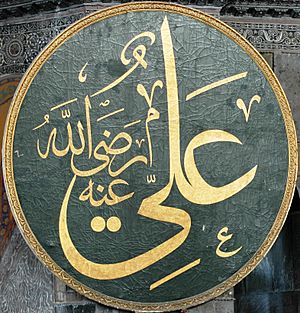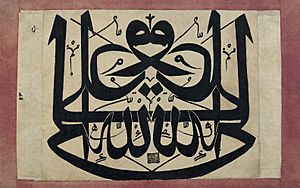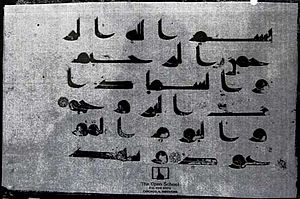Ali facts for kids
Quick facts for kids Aliعَلِيّ |
|||||
|---|---|---|---|---|---|
|
|||||

Calligraphic seal featuring Ali's name, on display in the Hagia Sophia
|
|||||
| 4th Caliph of the Rashidun Caliphate | |||||
| Reign | 656–661 | ||||
| Predecessor | Uthman ibn Affan | ||||
| Successor | Abolished position Hasan ibn Ali (as caliph) |
||||
| 1st Shia Imam | |||||
| Tenure | 632–661 | ||||
| Predecessor | Established position | ||||
| Successor | Hasan ibn Ali | ||||
| Born | c. 600 CE Mecca, Hejaz, Arabia (present-day KSA) |
||||
| Died | c. 28 January 661 (c. 21 Ramadan AH 40) (aged c. 60) Kufa, Rashidun Caliphate (present-day Iraq) |
||||
| Burial | Imam Ali Shrine, Najaf 31°59′46″N 44°18′51″E / 31.996111°N 44.314167°E |
||||
| Spouse |
|
||||
| Issue | |||||
|
|||||
| Tribe | Quraysh (Banu Hashim) | ||||
| Father | Abu Talib ibn Abd al-Muttalib | ||||
| Mother | Fatimah bint Asad | ||||
| Religion | Islam | ||||
| Signature |  |
||||
| Arabic name | |||||
| Personal (Ism) | Ali | ||||
| Patronymic (Nasab) | Ali ibn Abu Talib ibn Abd al-Muttalib ibn Hashim ibn Abd Manaf ibn Qusai ibn Kilab | ||||
| Teknonymic (Kunya) | Abu al-Hasan | ||||
| Epithet (Laqab) | Abu Turab | ||||
Ali ibn Abi Talib (born around 600 CE – died 661 CE) was a very important figure in Islam. He was the last of the four Rightly Guided Caliphs, who led the Muslim community right after the death of Muhammad. He was also the first Shia Imam.
Contents
Biography
Ali was born in Mecca around 600 CE. His parents were Abu Talib and Fatimah bint Asad. Some Muslims celebrate his birthday on the 13th of Rajab each year.
Ali was a cousin of Muhammad, the founder of Islam. Muhammad raised Ali from a young age, starting when Ali was about five years old. When Ali was around nine to eleven, Muhammad announced that he had received messages from God. Ali played a key role in the early days of Islam, especially when Muslims faced difficulties in Mecca.
In 622, Muhammad moved to Medina. Ali later married Muhammad's daughter, Fatima. They had two sons, Hasan and Husayn, who are very important figures in Shia Islam.
Muhammad called Ali his brother, guardian, and successor. Ali was known for his bravery and carried the flag in most battles. After Muhammad's death, there was a disagreement about who should lead the Muslim community. This led to a major split, dividing Muslims into two main groups: Shia and Sunni.
Shias believe that Muhammad chose Ali to lead Islam. However, while Ali was preparing Muhammad's body for burial, some Muslims chose Abu Bakr as the new leader. Ali later accepted Abu Bakr's leadership. He also advised the next two leaders, even though he didn't take part in political activities at first.
After the third leader, Uthman, was killed, Ali was chosen as the next Caliph. His time as leader saw the beginning of civil wars among Muslims. Ali faced groups who disagreed with his leadership. He won against one group, but his army was later defeated in the Battle of Siffin. Sadly, Ali himself was killed in the Grand Mosque of Kufa.
The Imam Ali Shrine and the city of Najaf were built around Ali's burial place. Millions of people visit it every year. Ali is seen by many as a great example of devotion and pure Islam. Many books contain his sayings, speeches, and prayers, with the most famous being Nahj al-Balagha.
After Ali's death, the Muslims in Kufa chose his oldest son, Hasan, as their leader. Ali had often said that only the People of Muhammad's Household should lead the Muslim community.
Family and Descendants
Ali had many children from different wives. His sons, Hasan, Husayn, and Muhammad ibn al-Hanafiyya, played important roles in history. Only five of his sons had children who continued the family line.
Ali had four children with Muhammad's youngest daughter, Fatima: Hasan, Husayn, Zaynab, and Umm Kulthum. After Fatima passed away, Ali married other women. His other well-known sons included Abbas and Muhammad ibn al-Hanafiyyah.
Ali's descendants through Fatima are called Sharif or Sayyid. Both Shias and Sunnis respect them as the only remaining family line of Muhammad. Ali did not marry any other women while Fatima was alive.
Hasan was Ali and Fatima's oldest son. He became the second Shia Imam and also served as Caliph for a few months after Ali's death. He died later after being poisoned. Husayn was Ali and Fatima's second son and the third Shia Imam. He disagreed with the ruler Yazid in 680 AD and was killed in the Battle of Karbala along with many of his companions. In this battle, six other sons of Ali were also killed.
Ali's family believed that only the Ahl al-Bayt should lead Muslims. They led several uprisings against rulers over time. Some of these uprisings led to the formation of governments by Ali's descendants, like the Fatimids.
Important Writings
Many of Ali's important works were originally speeches and sermons. His companions later wrote them down. He also taught his companions special prayers.
- Nahj al-Balagha: This is one of the most famous and important books in the Islamic world. It contains many of Ali's sermons, letters, and sayings.
- Ghurar al-Hikam wa Durar al-Kalim: This book has over ten thousand short sayings from Ali.
- Mus'haf of Ali: This is believed to be a copy of the Qur'an that Ali himself put together. He was one of the first people to write down the divine messages.
- Kitab Ali: This is a collection of Muhammad's sayings that Ali wrote down.
Ali is also known for passing on hundreds of sayings from Muhammad, called hadiths. These are collected in various books. There are also poetry collections, called diwans, that contain poems believed to be written by Ali, though some were written by others.
Personality
Ali is often described as a strong and brave person. He had broad shoulders and a long white beard.
Many sources describe Ali as cheerful, gentle, and generous. Across almost all parts of Islam, Ali is seen as a perfect example of important virtues, especially justice. He was known for treating all Muslims fairly.
Names and Titles

Ali has many names and titles in Islamic tradition. Some describe his character, while others come from events in his life. Here are a few:
- Abu al-Hasan: Means "father of Hasan," named after his oldest son.
- Abu Turab: Means "father of the dust." Muhammad gave him this title when he saw Ali sleeping covered in dust.
- Amir al-Mu'minin: Means "prince of the faithful." This is a very special title, especially for Shias, who believe it belongs only to Ali.
- Asadullah: Means "lion of God."
- Haydar: Also means "lion," showing his bravery.
In Muslim Culture
Ali is a hugely important figure in Islamic culture, second only to Muhammad. He is seen as a founder of Arabic public speaking and grammar. In Muslim culture, Ali is respected for his courage, honesty, strong dedication to Islam, generosity, and his fair treatment of everyone. He is also remembered as a very skilled speaker.
See also
 In Spanish: Alí Ibn Abi Tálib para niños
In Spanish: Alí Ibn Abi Tálib para niños
- Outline of Islam
- Glossary of Islam
- Index of Islam-related articles
- Alevism
- Ali in Muslim culture
- Al-Farooq (title)
- Ghurabiya
- Hashemites Royal Family of Jordan
- Idris I The First King of Morocco Founded 788
- List of expeditions of Ali during Muhammad's era
 | Roy Wilkins |
 | John Lewis |
 | Linda Carol Brown |


